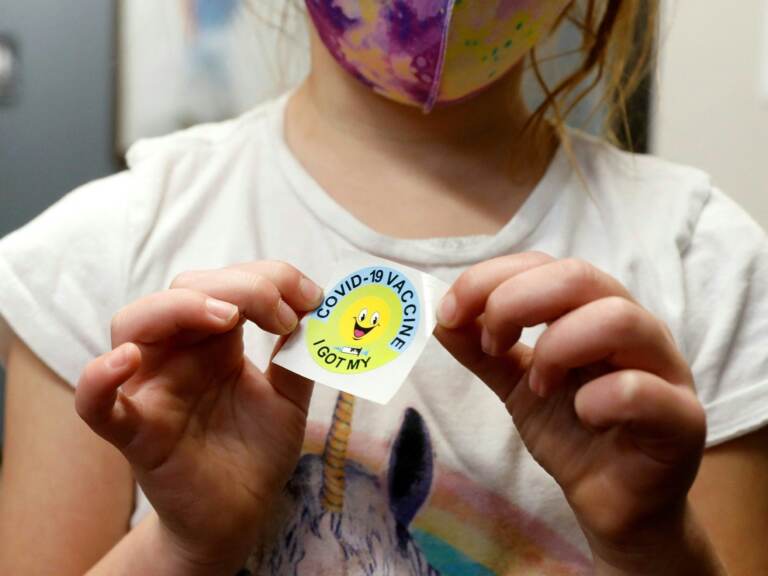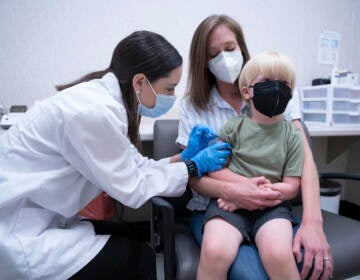What you can expect when vaccines become available for kids under 5

A 6-year-old child holds a sticker she received after getting the Pfizer-BioNTech COVID-19 vaccine at the Child Health Associates office in Novi, Mich., on Nov. 3. (Jeff Kowalsky/AFP via Getty Images)
Vaccines for children under five are expected to be approved early next year, but officials and pediatricians say the slow uptake among hesitant parents for the 5-11 age group could extend to the youngest children too.
Dr. Francis Collins is director of the National Institutes of Health and spoke with NPR’s All Things Considered about the timeline for emergency use authorization of the vaccine for kids under 5, and the ongoing efforts to immunize those aged 5 to 11.
As with older Americans, before the vaccine makers can submit for FDA emergency use authorization, they must first conduct trials to ensure the vaccine is safe and effective.
For children under five, these trials are split into two different groups: those aged 2-5, and those aged six months to two years.
“Both of those have had data generated in a carefully controlled trial, and those are going to be submitted and [the] FDA will review them,” Collins said.
“But I think it will be by the first of the year before we have approval for those younger ages.”
How vaccinations are going for the 5-11 age group
But Collins also noted that vaccination rates for kids aged 5-11 haven’t been what public officials had hoped for so far.
“Parents, I think for the most part, have been a little reluctant to decide to get their kids immunized,” Collins said.
“A lot of work has been done to make it easy to do that by getting vaccinations to pediatricians offices and even to schools. But I think we are still even short of half of the kids in that age group getting immunized.”
Despite the reluctance, Collins says he thinks the uptake will increase as parents talk to their pediatricians and become more comfortable with the vaccines.
How pediatricians are approaching conversations with parents
The conversations with parents do seem to have an impact, according to those on the frontline.
Dr. Jacob Kilgore is a pediatric infectious disease specialist with Marshall Health in Huntington, West Virginia. Only 41.5% of the eligible population of the state is fully vaccinated.
While there are a number of reasons for the low rate, Kilgore says one of the barriers is simply a lack of easy access to healthcare in some areas outside large cities.
Another reason is hesitation among parents – something Kilgore says pediatricians are combatting by having more conversations. And when talking with parents about their child and vaccines, Kilgore says it’s important to meet the parents halfway.
“It’s answering questions and concerns or inquiries they may have about the vaccine,” Kilgore says. “What we’ve seen, once we have an opportunity for those that are a little more hesitant to sit and have a conversation … [is] an increasing proportion of parents being very supportive.”
Misinformation about the vaccines has also been an issue public health officials have faced with the rollouts, Collins says.
“I have a lot of sighs about where we are as a country and a lot of heartbreak about hundreds of thousands of people whose lives have been lost,” he said. “And many of those didn’t need to die if they’d had accurate information that they could have responded to, instead of being brought into a place where they gave up on an opportunity that could have saved their lives.”
Kilgore says sharing a few facts associated with the 5-11 age group usually helps reassure parents about the safety of the vaccines.
“Number one, the vaccine technology has been readily studied,” Kilgore says. “Of the participants who were studied, and including those with potential adverse side effects, the side effect profile was quite minimal.”
Kilgore says he also focuses on the fact the dose for children is smaller than adults.
“I think that has ultimately attenuated the side effect profile as well, but we’ve still seen maximum efficacy at that lower dose, which is really a wonderful mix of productivity, whereas low concern of adverse side effects,” he says.
Pediatricians are playing the long game when it comes to vaccines
Dr. Kathryn Moffett is a pediatric infectious disease specialist at Mountain State Cystic Fibrosis Center in Morgantown, W.V.
She has seen the full range of parents, from those who were excited to vaccinate their kids as soon as vaccines were available, to parents who were hesitant and just wanted to ask some questions first, and then parents who were not interested in having a conversation at all.
One of the concerns some parents have expressed about the vaccines is over a rare side effect called myocarditis, or an inflammation of the heart.
In her career, Moffett has seen children with myocarditis, but says those cases are usually mild and resolve within a day or two. So when she sees parents who express concern over the condition, she explains that the risk of a child developing it from COVID is higher than the chances of a child having myocarditis as a side effect of the vaccine.
Moffett says she spoke with one family who expressed concerns about vaccinating their 15-year-old son.
“They said, ‘Well, we’re worried he’s a boy. He’s 15, we’re worried that he’s going to be vaccinated and get myocarditis.’ And I said, yeah, valid concern, but it’ll be mild,” Moffett said.
“But the worry that I have is he gets COVID and then his risk is multiple fold higher of actually getting severe myocarditis from COVID.”
The family hasn’t decided to vaccinate their son yet, but Moffett says she will revisit the topic another time and stresses that it’s important for pediatricians to not get discouraged.
“As pediatricians, we are advocates with a family for children’s health,” she says. “And when we don’t succeed in one point of getting someone vaccinated, we need to still be the advocates and tell people what new information is available and realize that vaccines are safe and they’re effective.”
9(MDAzMzI1ODY3MDEyMzkzOTE3NjIxNDg3MQ001))



![CoronavirusPandemic_1024x512[1]](https://whyy.org/wp-content/uploads/2020/03/CoronavirusPandemic_1024x5121-300x150.jpg)

